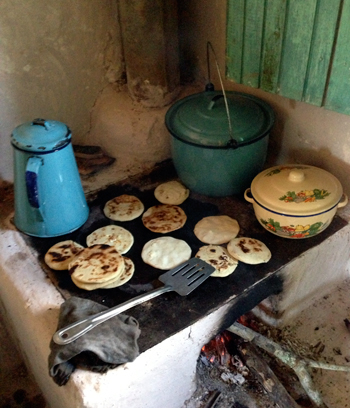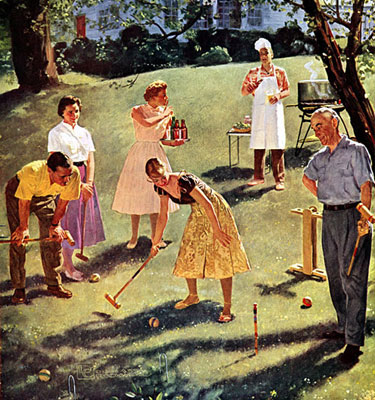 Google Maps will tell you that "we could not understand" the location of Las Aradas, Honduras. Weather.com advises to check your spelling. My trip coordinator suggested looking up the "nearest town over" which was a two and half hour drive away. Packing for a trip like this was a bit of a moving target. Las Aradas is a mountain village, six hours out of San Pedro Sula. For those of you who haven't been browsing the State Department's travel warnings lately--Honduras is not a stable country. The PeaceCorps pulled their volunteers out last year.
Google Maps will tell you that "we could not understand" the location of Las Aradas, Honduras. Weather.com advises to check your spelling. My trip coordinator suggested looking up the "nearest town over" which was a two and half hour drive away. Packing for a trip like this was a bit of a moving target. Las Aradas is a mountain village, six hours out of San Pedro Sula. For those of you who haven't been browsing the State Department's travel warnings lately--Honduras is not a stable country. The PeaceCorps pulled their volunteers out last year.
Was I scared? Yes. Sometimes. We joked about it a lot. Honduras is the murder capital of the world. Like, actually. Reference the state department website. San Pedro Sula, where I flew in and out of and stayed two nights has more homicides than any other city in. the. world. However, the people that I was traveling with were INCREDIBLE. They make me want to change my life. They make me realize what is possible to do in life.
Anyway, back to Las Aradas. Remote. Good tortillas. Minimal gun shots. (You have to celebrate St. Patty's day or a soccer win somehow.) They have running water, but no electricity. The roosters start crowing at 3:00 a.m. That sort of thing.
I was traveling with a team of twenty-five volunteer doctors, dentists, nurses, and interpreters from MEDICO, setting up a clinic for the week. It was my second trip like this and one of many I hope to do in my lifetime. I got up close and personal with the Honduran people. Or some of them. And they are lovely. It is hard to describe what these trips bring to my life: joy, energy, perspective. The company of people for whom I have a profound respect. The company of people who are hilarious in just the right way. But this isn't a story about me or the patients we cared for that week. I want to tell you about who took care of us.
 Fema is from Las Aradas, and was hired by MEDICO to cook for us during the week we were working in the clinic. She lives up the hill from where we were staying, on a wide expanse of land. She owns her own "pulpería" or small market store. During the week we were there she moved next to the clinic to brew our clove-flavored coffee by nubs of candlelight in the morning.
Fema is from Las Aradas, and was hired by MEDICO to cook for us during the week we were working in the clinic. She lives up the hill from where we were staying, on a wide expanse of land. She owns her own "pulpería" or small market store. During the week we were there she moved next to the clinic to brew our clove-flavored coffee by nubs of candlelight in the morning.
She cooked three meals a day for the twenty-five of us over one small wood-burning stove with a flat top griddle. Her tortillas were hand made, slapped together in the kitchen, with a little cheese in the middle when we were lucky. She made beans, yucca hashbrowns, tacos, strange little peppers that lit up fire-hot and cooled off just as quickly, french toast, pico-de-gallo, Honduran "chow mein," and everything in between. At the end of the day our feet were tired and her food was good.
Somehow Fema knew when clinic had really gotten busy and our stomachs were empty, and she'd come over with a stack of warm tostadas with beans and cheese and some freshly made coffee or lemon grass tea (water boiled with an actual curl of lemon grass.) There were times when the line of people wrapped around the building--complaints of pain, rashes, parasitic infections, malnutrition, infected wounds, lice, and patients asking to have teeth pulled. There were days we finished dispensing medications in the pharmacy by headlamps to serve everyone. We saw more than 1,200 patients that week.
 Fema may have been pouring the coffee, but her body language read power. When you walked in the kitchen--you knew it who it belonged to. One meal she set out a bowl of salt that looked suspiciously like cheese, and many of us doused our first helping. I'm not entirely convinced she wasn't messing with us. It takes more than just fluent Spanish to get in Fema's inner circle.
Fema may have been pouring the coffee, but her body language read power. When you walked in the kitchen--you knew it who it belonged to. One meal she set out a bowl of salt that looked suspiciously like cheese, and many of us doused our first helping. I'm not entirely convinced she wasn't messing with us. It takes more than just fluent Spanish to get in Fema's inner circle.
One of our last days in the village, she turned 70. A few members of the team left clinic early that morning to help in the ER at a hospital a few hours away. On their return they brought cake, a piñata, and even ice cream in a "cooler" they McGuyvered out of ice in a duct-taped box.
We surprised Fema that night with a birthday celebration after dinner and sang her happy birthday in English and then in Spanish. Her tough exterior cracked (just a little) as she let our funny little brigade of Americans celebrate her and serve her cake. One of the local doctors translated as she told us, "You have touched my heart."
Fema's picture is framed above my kitchen sink because while I only knew her a short time, I believe she is a woman worth considering on a regular basis.
Jessica Dixon manages a physician practice in Chicago. In her spare time she pursues aged goudas and adventures.


